Special Report
The Happiest Countries in the World

Published:
Last Updated:

The Norwegians and the Swiss have the highest life satisfaction in the world, according to the newest edition of the Better Life Index. According to the study, published annually by the Organization for Economic Co-operation and Development, the United States, which has not been in the top 10 for life satisfaction in years, is tied for 14th.
The Better Life Index rates the 35 OECD member nations as well as Brazil, Russia and South Africa on a number of variables that contribute to overall well-being, including income, education, housing, health, and life satisfaction.
[in-text-ad]
South Africa had the lowest life satisfaction rating, while Switzerland and Norway had the highest life satisfaction score. Denmark, which had long held the top spot in the last report, ranked third this year. 24/7 Wall St. reviewed the 10 countries with the highest life satisfaction score.
Click here to see the happiest countries.
Money does not buy happiness. Households in the United States, for example, have the highest average disposable income of the 38 nations reviewed, yet the nation ranked 14th. In general, however, wealthier nations are more likely to have the conditions that lead to higher well-being. Each of the 16 countries with the lowest life satisfaction have a below-OECD average net disposable income. Switzerland and Norway, which have the highest life satisfaction scores, rank third and fourth in disposable income.
A healthy job market appears to be another important factor contributing to a more satisfying life. Of the 10 least happy nations, six had among the 10 highest unemployment rates of nations reviewed. Norway, Switzerland, Denmark, and Iceland, the four happiest countries, each had among the lowest unemployment rates. In addition to insuring a stable source of income, employment has been shown to provide workers with a sense of purpose.
A strong support network has also been shown to be critical to mental well-being and overall happiness, and all 10 of the countries with the highest life satisfaction have average or above-average shares of adults who report strong social support networks. Eight of the happiest nations rank in the top 10 in this measure.
Good personal health, too, can contribute to a person’s overall happiness. On average, across the OECD, 69% self-report being in good health. In eight of the 10 happiest countries, at least 75% self-report good health. In the 10 happiest countries, life expectancy is above average in every case.
To determine the happiest countries in the world, 24/7 Wall St. reviewed the countries that received the highest life satisfaction scores from the Organization for Economic Cooperation and Development’s Better Life Index. In addition to the 35 member countries, the OECD included Brazil, Russia, and South Africa in its report. The OECD rated countries on eleven categories: housing, income, jobs, community, education, environment, civic engagement, health, safety, work-life balance, and life satisfaction. Additionally, we examined 2016 unemployment rates from the International Monetary Fund.
These are the happiest countries in the world.

10. Sweden
> Life satisfaction score: 7.3 (tied — 8th highest)
> Disposable income: $28,859 (10th highest)
> Life expectancy: 82.0 (9th highest)
Like those in every Nordic country, Sweden’s residents report some of the highest levels of life satisfaction among OECD nations. Sweden’s healthy work-life balance may help explain the country’s high degree of reported happiness. Sweden is considered to have some of the most generous parental leave and childcare policies in the world, and it recently concluded a two-year experiment in the city of Gothenburg testing the feasibility of a six-hour workday. Just 1.1% of Swedes work more than 50 hours a week, nearly the smallest share of any country surveyed by the OECD.
Sweden is also one of the healthiest countries in the world. More than four in five adults report they are in good health, one of the highest proportions among the 38 nations reviewed.
[in-text-ad]

9. Netherlands
> Life satisfaction score: 7.3 (tied — 8th highest)
> Disposable income: $27,759 (14th highest)
> Life expectancy: 81.4 (14th highest)
According the OECD’s Better Life Index, the Dutch have nearly the highest overall life satisfaction in the world. People in the Netherlands benefit from a healthy work-life balance and relative financial security. Less than 1% of the country’s labor force works 50 or more hours a week — well below the 13% OECD average, and second-lowest among the 38 nations reviewed. Because jobs in the country demand less time, people working full-time have an average of 15.9 hours of downtime a day, nearly the most of any country surveyed.
Financial security also appears to be an important component for overall life satisfaction — and the Netherlands is one of the wealthiest of the 38 countries considered. The average Dutch household owns the equivalent of $71,251 in net financial assets, more than the average in all but half a dozen other countries surveyed.
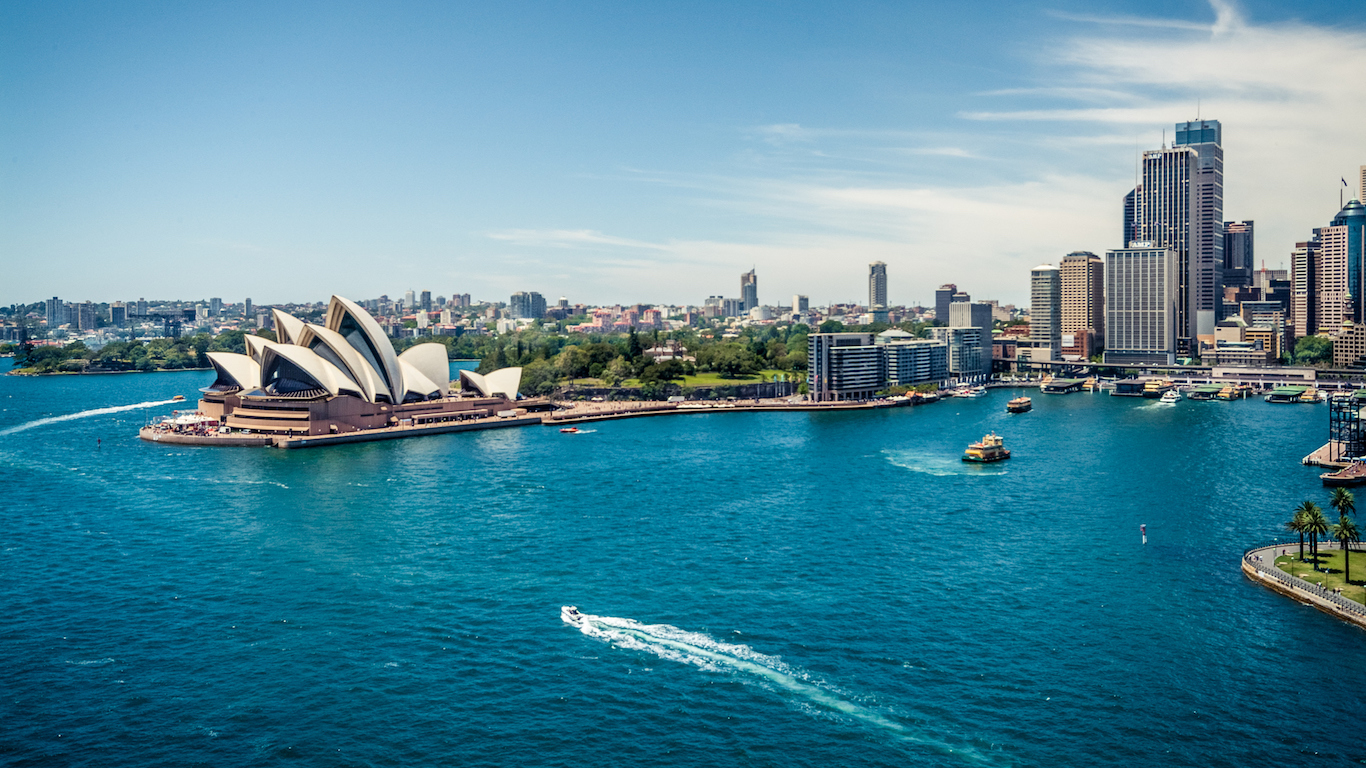
8. Australia
> Life satisfaction score: 7.3 (tied — 8th highest)
> Disposable income: $33,138 (5th highest)
> Life expectancy: 82.2 (6th highest)
Life satisfaction in Australia is bolstered in large part by close personal relationships and relative financial security. Some 95% of Australians say that they have a friend or relative they can count on if they are in trouble. In contrast, only 90% of Americans and an average of 88% of residents in OECD countries surveyed can say the same thing. Additionally, the average Australian household has $33,138 in disposable income, about $4,000 more than the average OECD household.
Australians also benefit from relatively little harmful pollution. The Australian government has implemented policies to reduce emissions to 5% below 2000 levels by 2020, and Australia currently has some of the cleanest air of any country surveyed.

7. New Zealand
> Life satisfaction score: 7.4 (tied — 5th highest)
> Disposable income: $23,213 (19th highest)
> Life expectancy: 81.4 (14th highest)
Good health is an important contributor to overall happiness. Roughly nine in 10 New Zealand residents report being in good health or better, more than any other country reviewed. New Zealanders also benefit from a particularly strong sense of community, which has been shown to be valuable in ensuring good mental health. When asked whether they had friends or relatives they could count on in times of need, 99% of respondents said they do — by far the largest share of any country surveyed by the OECD.
New Zealand is also one of the wealthiest countries in the world. The average household owns $81,271 in net financial assets, more than in all but a handful of countries. New Zealand levies some of the highest income taxes, however, and the nation’s disposable income per capita after taxes ranks in the middle of the 35 OECD member nations.
[in-text-ad]

6. Finland
> Life satisfaction score: 7.4 (tied — 5th highest)
> Disposable income: $28,238 (12th highest)
> Life expectancy: 81.1 (18th highest)
Like every other Nordic country, Finland ranks as one of the happiest in the world. The nation’s high quality of life is strengthened by its relatively safe communities. Some 86% of people living in Finland feel safe walking alone at night, in stark contrast to the comparable 68% average among OECD countries. Perceptions of safety are well founded in Finland. There are 1.5 murders a year for every 100,000 residents in Finland, well below the 4.1 per 100,000 people average homicide rate in the OECD.
Education can be critical to the foundation of individual well-being as well as broader social well-being. The average Finnish resident spends 19.7 years in school after the age of five, more time than residents of any other country considered.
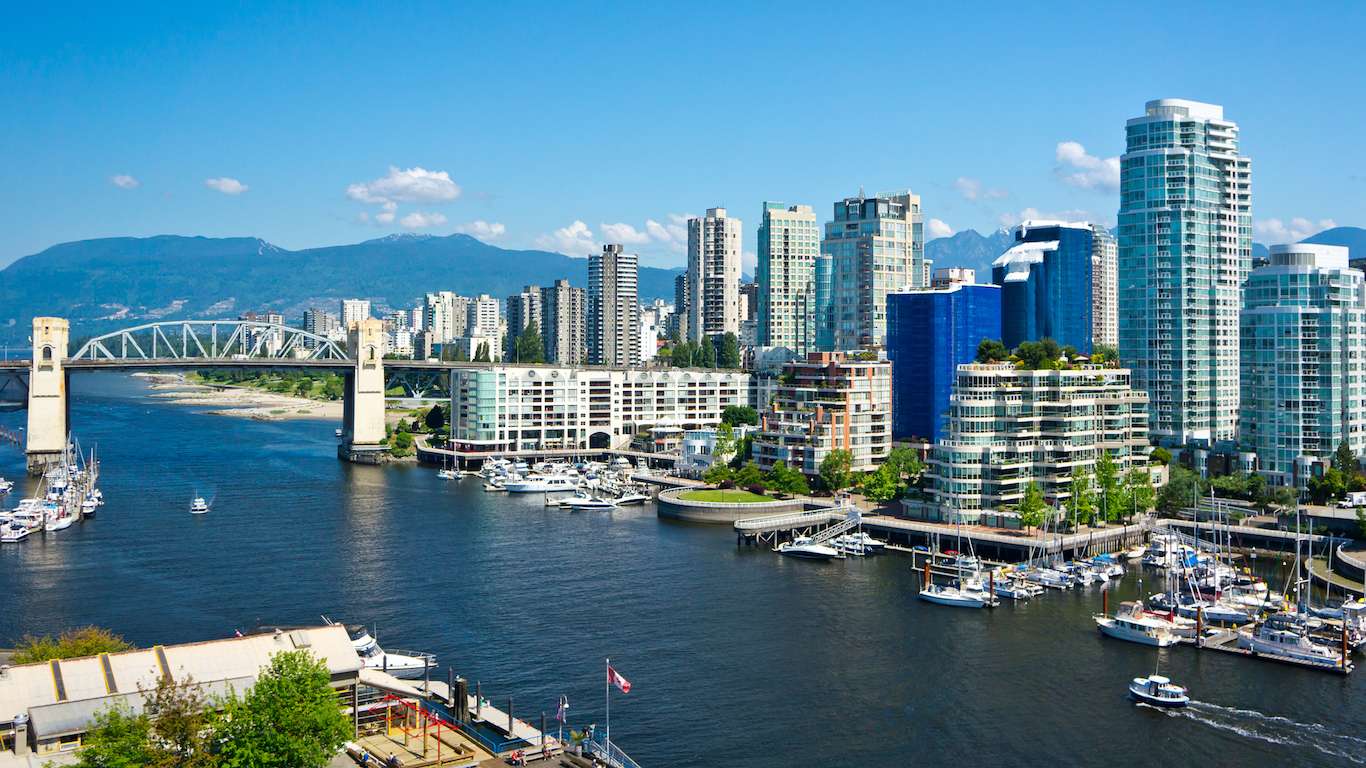
5. Canada
> Life satisfaction score: 7.4 (tied — 5th highest)
> Disposable income: $30,474 (8th highest)
> Life expectancy: 81.5 (13th highest)
Having a healthy support network of friends and family to rely on in times of crisis is one of the strongest indicators of life satisfaction. Only 6% of Canadians do not have such a support network, one of the lowest shares among the 38 nations reviewed. In addition to being able to rely on their social network, Canadians tend to trust their broader community as well. An estimated 82% of Canadians feel safe walking alone at night, much greater than the 68% share of residents of OECD countries.
Good physical health has also been shown to be closely tied with good mental health. In Canada, 89% of residents report being in good health, second highest among nations reviewed and well above the OECD average of 69%.
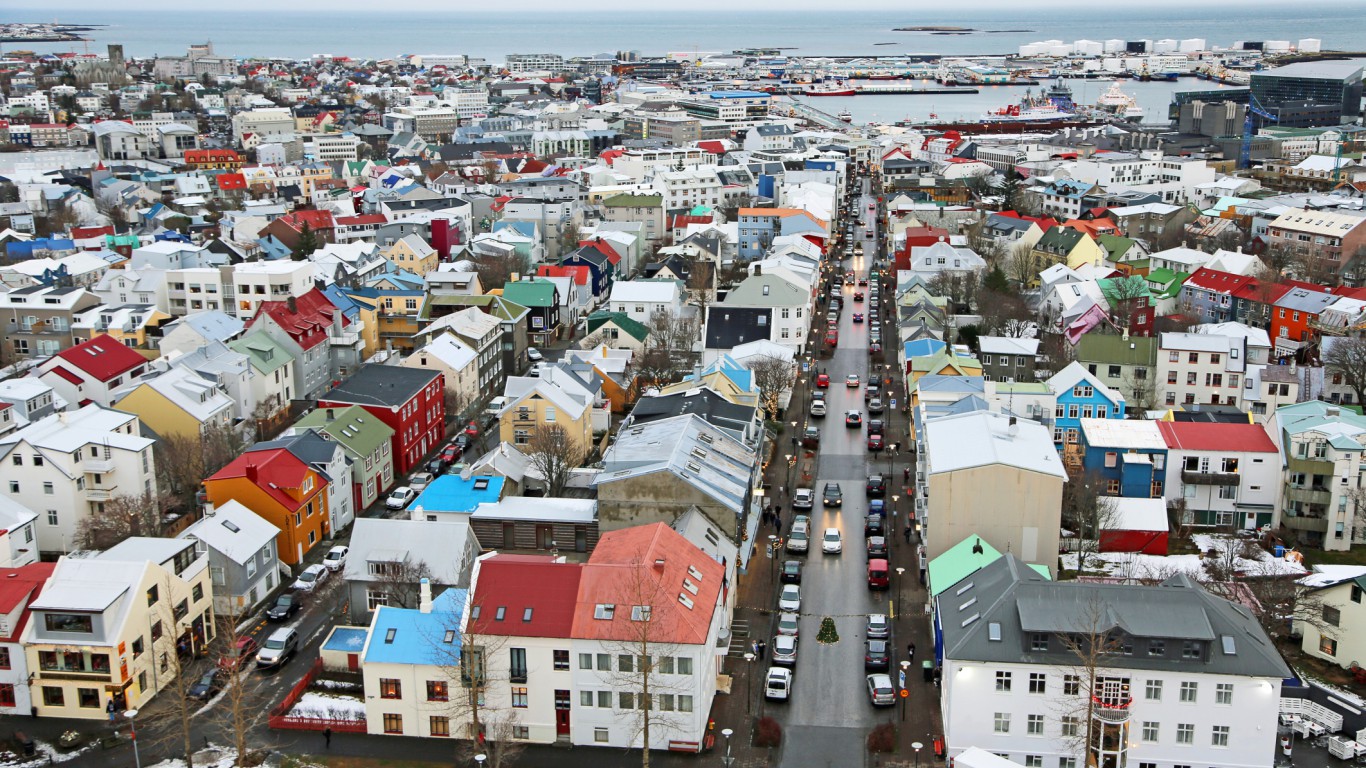
4. Iceland
> Life satisfaction score: 7.5 (tied — 3rd highest)
> Disposable income: $27,918 (13th highest)
> Life expectancy: 82.1 (7th highest)
While Iceland was one of the countries hit hardest by the 2008 financial crisis, its economy has grown substantially unemployment has improved in recent years. According to the International Monetary Fund, just 3.4% of the country’s workforce is unemployed, the second lowest rate of any OECD nation. Also, the nation’s GDP per capita of $57,889 is the fifth highest of all countries reviewed. Iceland’s economic comeback was likely aided by the country’s well-educated workforce. The average Icelandic resident spends nearly 20 years in school — tied with Denmark as the second most of any OECD country.
In addition, Iceland ranks highly in social network strength. Roughly 96% of residents report having friends or family they can count on in times of trouble, far more than the 88% OECD average.
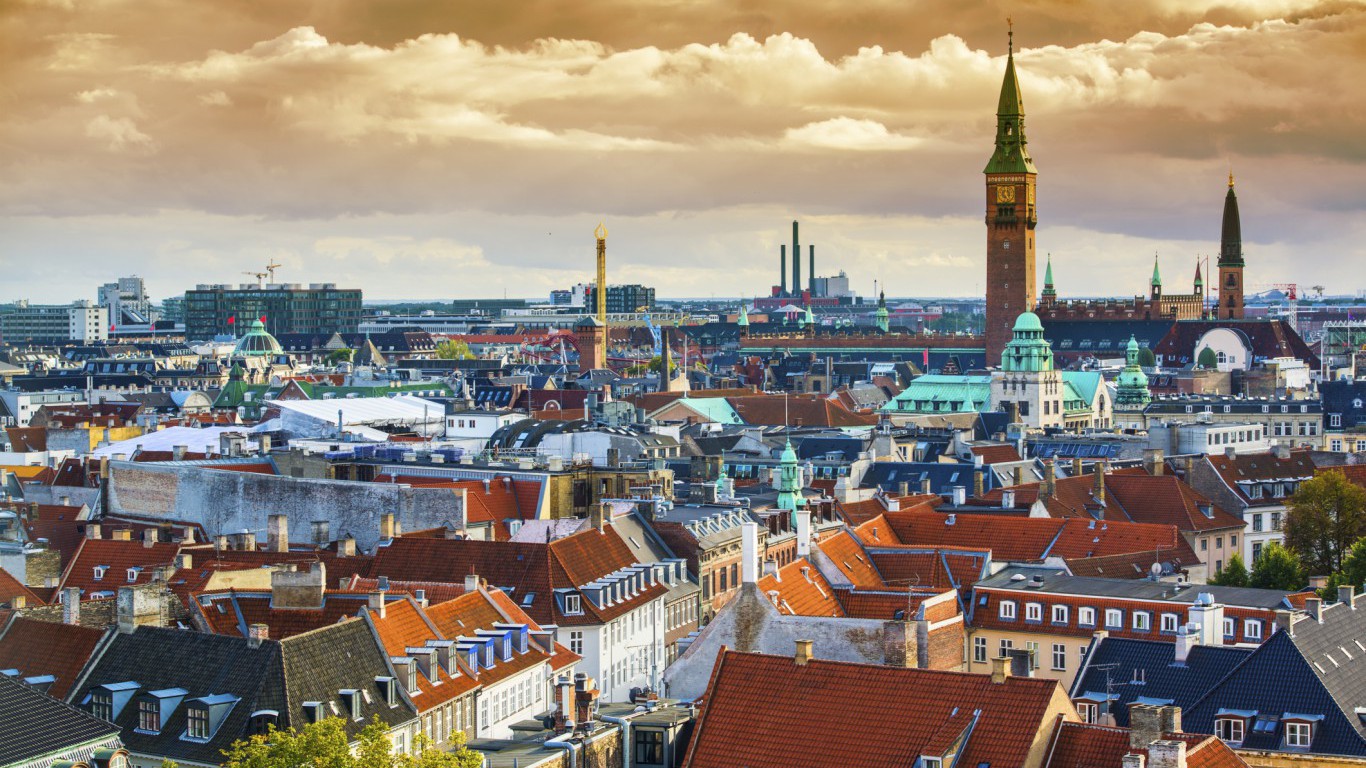
3. Denmark
> Life satisfaction score: 7.5 (tied — 3rd highest)
> Disposable income: $26,945 (16th highest)
> Life expectancy: 80.4 (24th highest)
Close personal relationships are one of the most important factors in personal happiness, and most people in Denmark have strong support networks. Some 96% of Danes responded positively when asked if they had a friend or family member who would help if they were in trouble, the second highest share among the 38 nations reviewed after only New Zealand.
The Danish people are also feel relatively safe in their broader community. Of Danes aged 15 and older, 85.2% report feeling safe when walking alone at night, a higher share than in all but three OECD countries. The Danes’ confidence in their own safety is supported by the scarcity of violent crime. There are only 0.3 homicides in the country for every 100,000 Danes annually, fewer than in every country surveyed with the exception of the U.K. and Luxembourg.
[in-text-ad]
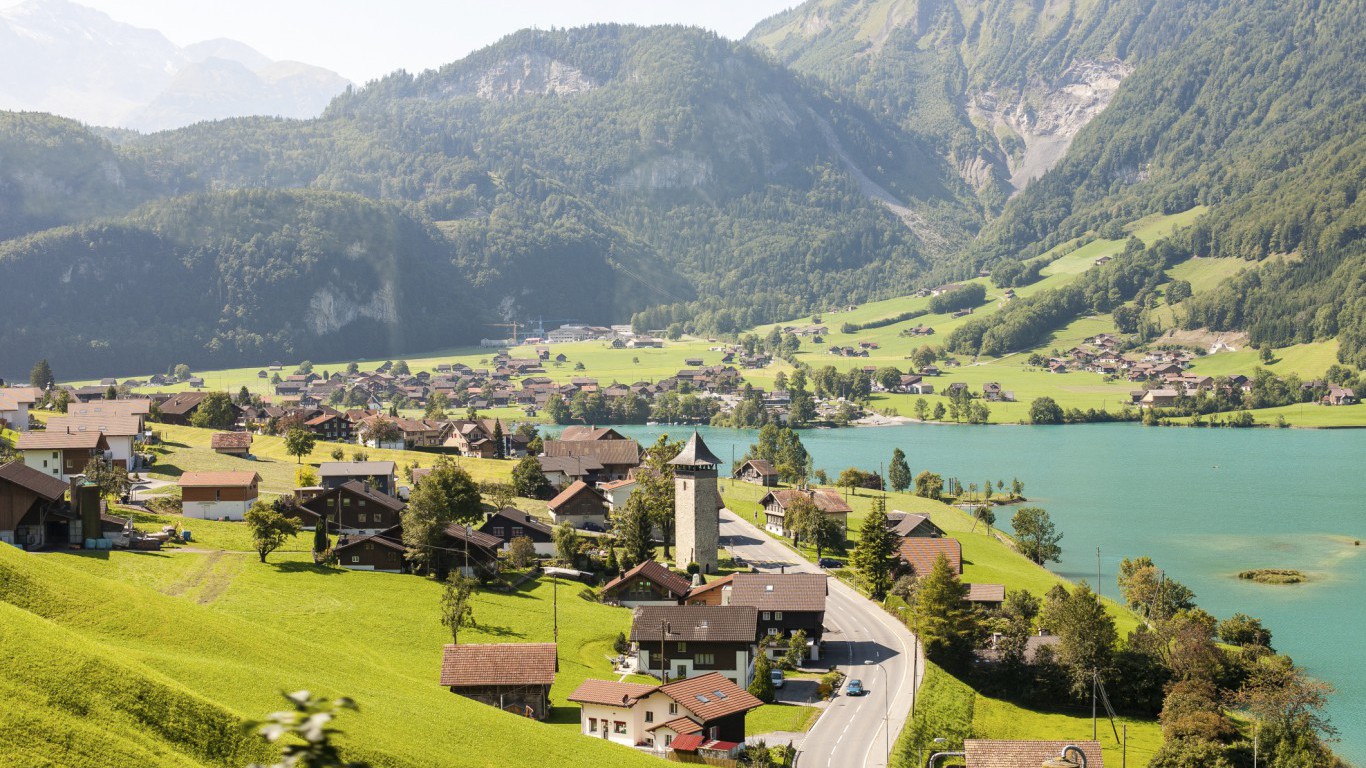
2. Switzerland
> Life satisfaction score: 7.6 (tied — the highest)
> Disposable income: $35,952 (3rd highest)
> Life expectancy: 82.9 (3rd highest)
Switzerland is tied with Norway as the happiest country in the world. Widespread employment opportunities and financial prosperity largely explain the high life satisfaction in the Central European country. Some 80% of the country’s working age population are employed, the second highest share of all countries surveyed. Also, Switzerland is the only country other than the United States among OECD nations to report a six-figure household financial net worth.
Health and relative safety also contribute to life satisfaction among the Swiss population. At 82.9 years, life expectancy in Switzerland is higher than in all but two other countries considered. Additionally, 87.4% of people in Switzerland feel safe walking alone at night, a larger share than any other country considered with the exception of Norway.
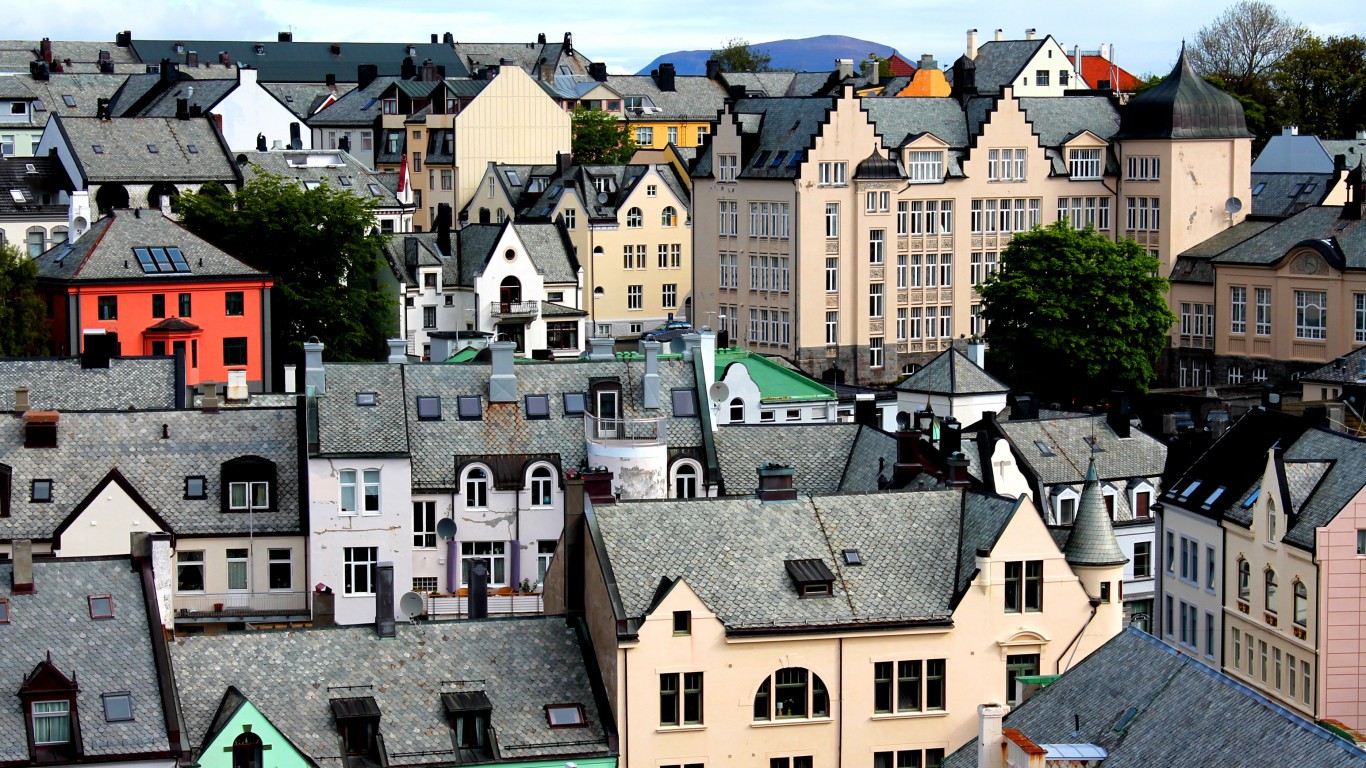
1. Norway
> Life satisfaction score: 7.6 (tied — the highest)
> Disposable income: $33,393 (4th highest)
> Life expectancy: 81.8 (11th highest)
Norway is one many Nordic countries where residents report some of the best work-life balance in the world. Just over 3% of working Norwegians work 50 or more hours a week, a much smaller share than the 13% average for all OECD nations. With an average of 15.6 hours a day devoted to leisure and personal care, Norwegians may have more spare time to dedicate to exercise and other healthful activities. An estimated 76% of Norwegians are in good health or better, one of the largest shares among the countries considered.
A high level of overall life satisfaction may also be due to the strong sense of safety that many Norwegians feel within their own community. Nearly nine in 10 residents report feeling safe walking alone at night, the highest share of any OECD country. With an average life satisfaction score of 7.6 overall, Norway is tied with Switzerland as the happiest country worldwide.
Thank you for reading! Have some feedback for us?
Contact the 24/7 Wall St. editorial team.